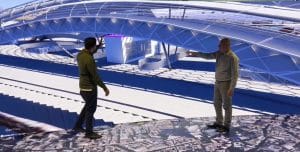The second day of the Geospatial World Forum 2023 witnessed a congregation of panellists from around the globe discussing the criticality of geospatial knowledge infrastructure in daily life, workflows, and as a service opportunity to increase the overall quality of geospatial databases everywhere.
Moderated by John Kedar, Strategic Advisor, Geospatial Infrastructure and Agencies, Geospatial World, UK; the session provided many thought-provoking perspectives for advancing geospatial knowledge infrastructure in the world economy and society.
John began the session by mapping the footprint and describing the importance of a well-made geospatial knowledge platform in different use cases.
“The geospatial knowledge infrastructure has a number of elements; integrated policy, foundation data, partnerships and collaborations, industry, modelling and applications that we use, and the wider ecosystem. It looks at those and then looks at how these need to come together to help us deliver geospatial knowledge to answer the questions we are being asked,”` John enlightened the crowd gathered for the session.
“We were not AI professionals so we teamed with a private firm and we started learning how we can transform knowledge from the past to the future. And we learnt a lot of lessons in identifying measurements understanding all measurement setups and transforming into a physical reality”, said Martin Salzmann, Corporate Strategy Advisor, Kadaster, The Netherlands.
Brig. Ali Al Shehhi, Director, National Space Science & Technology Centre, Board Member, Federal GIS Centre, UAE, explained the importance of a planned geospatial knowledge hub to incentivize various government strategies from academia to major stakeholders.
“Within the centre we are trying to implement some of the really challenging geospatial knowledge transfer and we are starting from the academia from the students going all the way to stakeholders and to partner around the world,” he explained.
“A really important thing about geospatial knowledge creation is that it is not only about humans or user interfaces. A lot of interactions that we will have should be put in place to derive knowledge from data and reduce human intervention as much as we can to catalyse machine to machine interaction”, said Sean Wiid, CEO, UP42, Germany
“Although we are not dealing with geospatial subject directly at a national level, what we are doing as part of industry is bringing a lot of key building blocks that are needed to take the vast variety of data and information that is out there and help to bring it into a format where people further down the line can turn it into wisdom”.
Dr. Siva Ravada, Vice President of Development, Oracle, US explained the difference between earlier modes of geospatial information and how interoperability has transformed the sector. He then reiterated that through a planned geospatial knowledge infrastructure, the overall quality of geospatial tools can be catapulted into a new foray.
“Earlier, a lot of discussions were around how difficult it was to use spatial technology because everything had a different system. Overtime, a lot of those technologies got integrated and even today the focus is on making all the spatial technology interoperable to different users”, he added.









